Slideshow: Where Breast Cancer Spreads
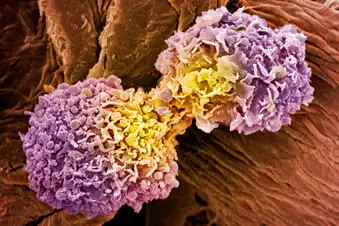
When Cancer Goes Beyond Your Breast
If your doctor told you that your breast cancer has spread to other parts of your body, it's at a more advanced stage than if it's only in your breasts. How far it has spread is one of the things your doctor will consider when they tell you the "stage" of your cancer. It's considered "metastatic" if it has spread far from your breasts. Every case is different. For some women, it becomes something they live with for a long time. For others, focusing on pain management and quality of life is the main goal.
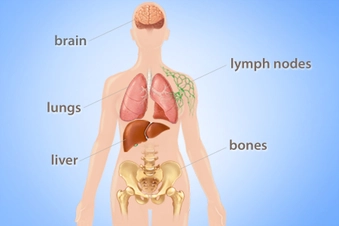
Most Common Places It Spreads
It's still breast cancer, even if it's in another organ. For example, if breast cancer spreads to your lungs, that doesn't mean you have lung cancer. Although it can spread to any part of your body, there are certain places it's most likely to go to, including the lymph nodes, bones, liver, lungs, and brain.
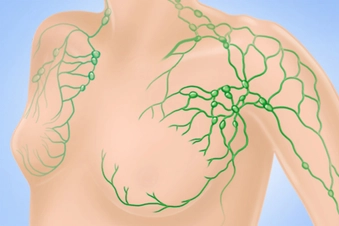
Lymph Nodes
The lymph nodes under your arm, inside your breast, and near your collarbone are among the first places breast cancer spreads. It’s “metastatic” if it spreads beyond these small glands to other parts of your body. When you're diagnosed with breast cancer, your doctor should check lymph nodes near the tumor to see if they're affected. The lymph system helps drain bacteria and other harmful things from your body. You might not notice symptoms if your breast cancer is in these nodes.
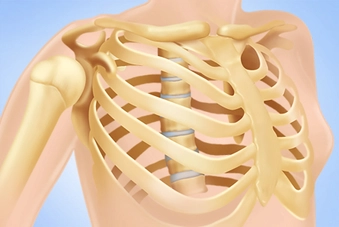
Bones
When breast cancer is in your bones, pain is usually the first symptom. It can affect any bone, including the spine, arms, and legs. Sometimes the bone may be weak enough to break, but treatment often prevents that. If the cancer involves your spine, it can also cause problems with incontinence or going to the bathroom. You might also have numbness or weakness in a part of your body, like an arm or leg. That happens when there’s pressure on the nerves of the spinal cord.
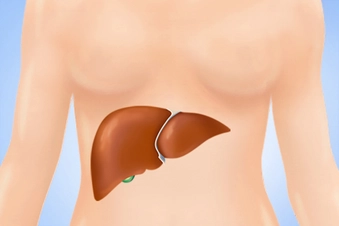
Liver
If breast cancer spreads to your liver, you may have pain in your belly that doesn’t go away, or you might feel bloated or full. You might also lose your appetite and lose weight. You may notice that your skin and the whites of your eyes are turning yellow, which is called jaundice. That happens because your liver isn’t working right.
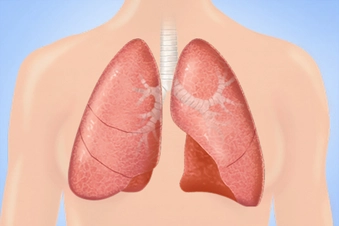
Lungs
Breast cancer can spread to the lungs or to the space between the lung and the chest wall, making fluid build up around the lung. Symptoms can include shortness of breath, a cough that won’t go away, and chest pain. Some people lose their appetite, leading to weight loss.
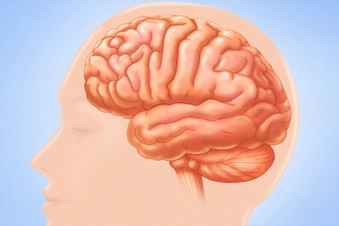
Brain
It's possible for breast cancer to spread to the brain. That can cause headaches that throw off your balance and make falls more likely. You may have numbness or weakness in one part of your body. You might act differently, or you could feel confused or have seizures.

Treatments
You may need surgery, chemotherapy, radiation, and medications. The drugs your doctor recommends will depend on your type of breast cancer. For instance, if your breast cancer is HER2 positive, in which a certain protein drives the growth, your doctor may choose targeted therapy as part of your treatment. Pain management is also key so you can feel as well as possible.
Show Sources
IMAGES PROVIDED BY:
1) STEVE GSCHMEISSNER / Science Photo Library / Getty Images
2) Susan Gilbert for WebMD
3) Susan Gilbert for WebMD
4) Susan Gilbert for WebMD
5) Susan Gilbert for WebMD
6) Susan Gilbert for WebMD
7) Susan Gilbert for WebMD
8) Jessica Key / E+ / Getty Images
SOURCES:
Dana-Farber Cancer Institute: "Metastatic Breast Cancer Expertise."
Dr. Susan Love Research Foundation.
American Cancer Society.
BreastCancer.org
Inflammatory Breast Cancer Research Foundation.
National Cancer Institute.
U.S. Preventive Services Task Force.
Cancer Research U.K.: "Symptoms of Secondary Breast Cancer."